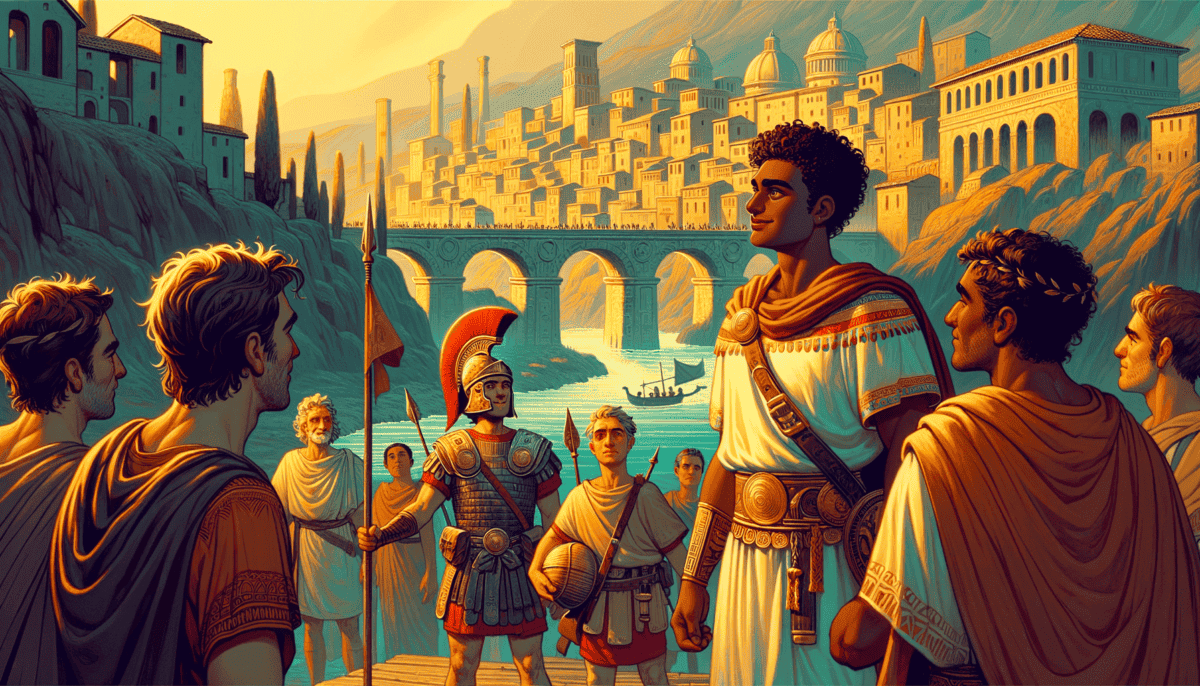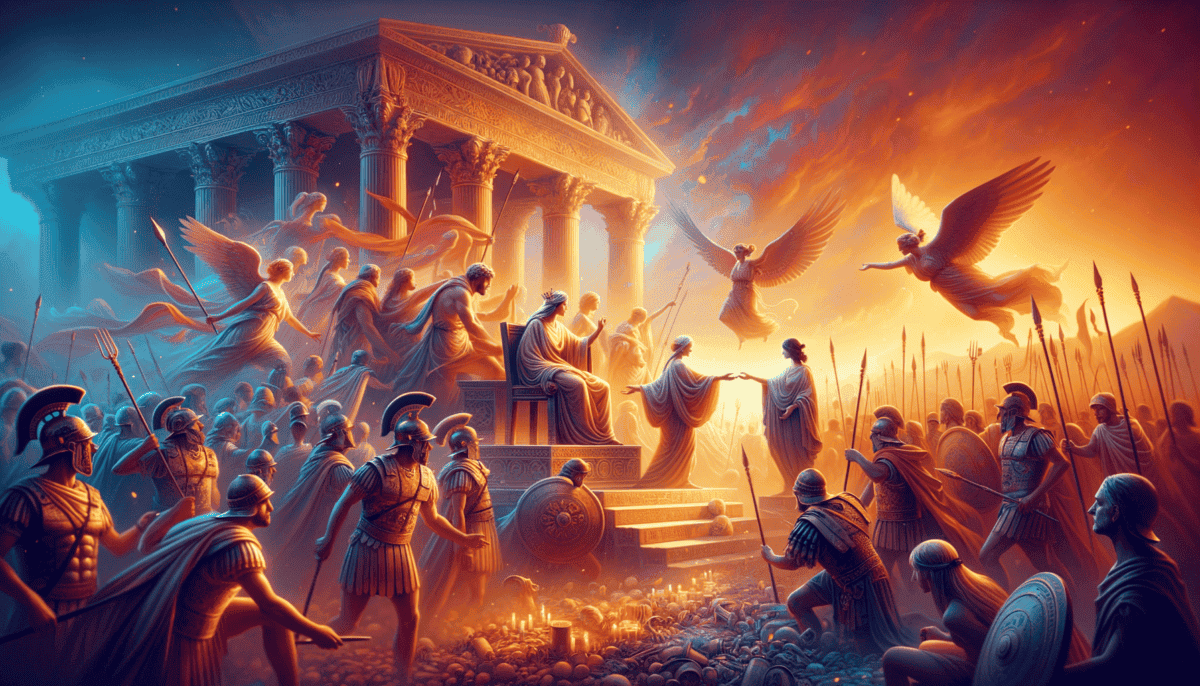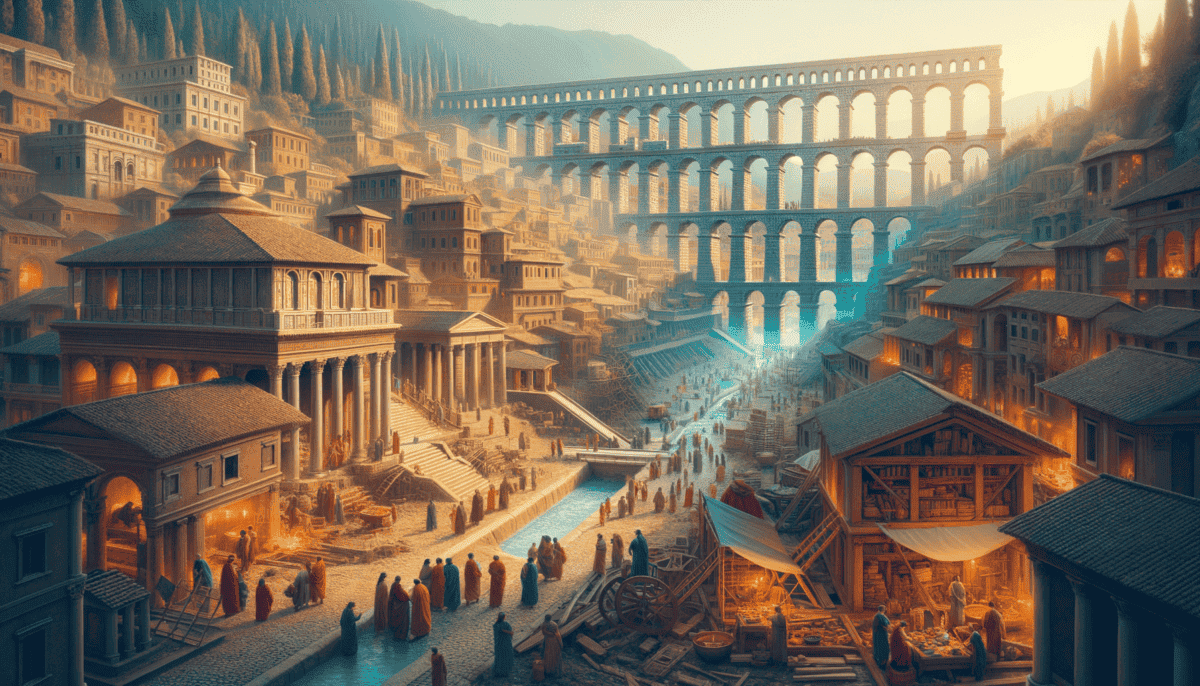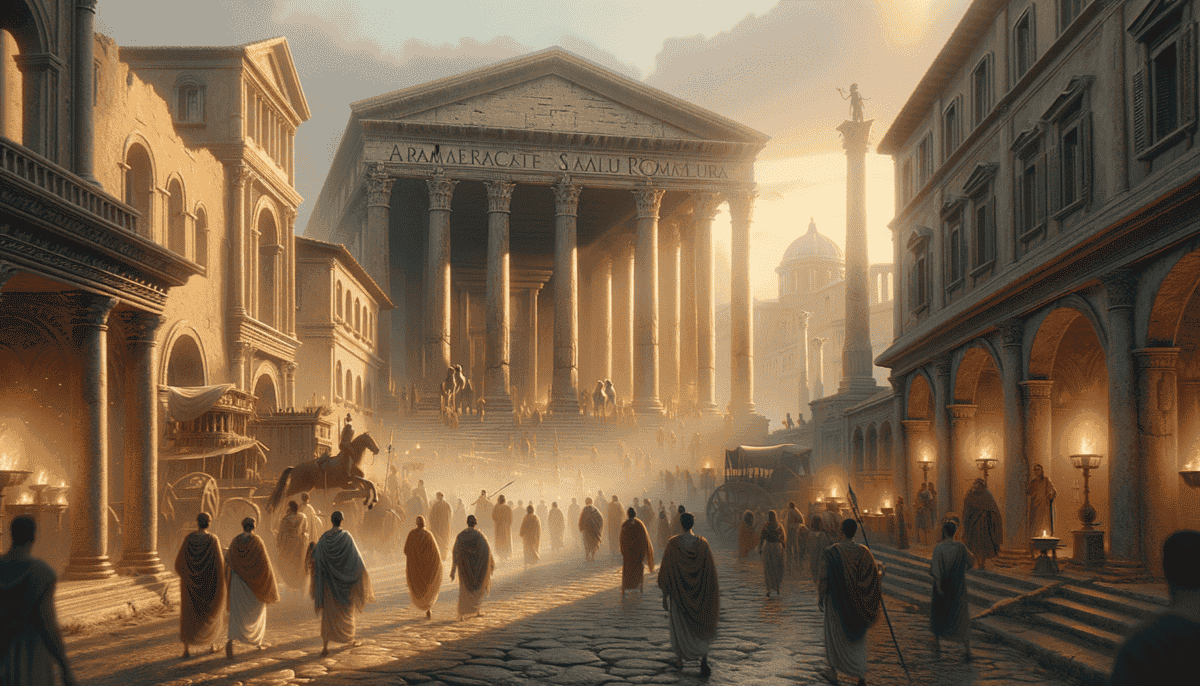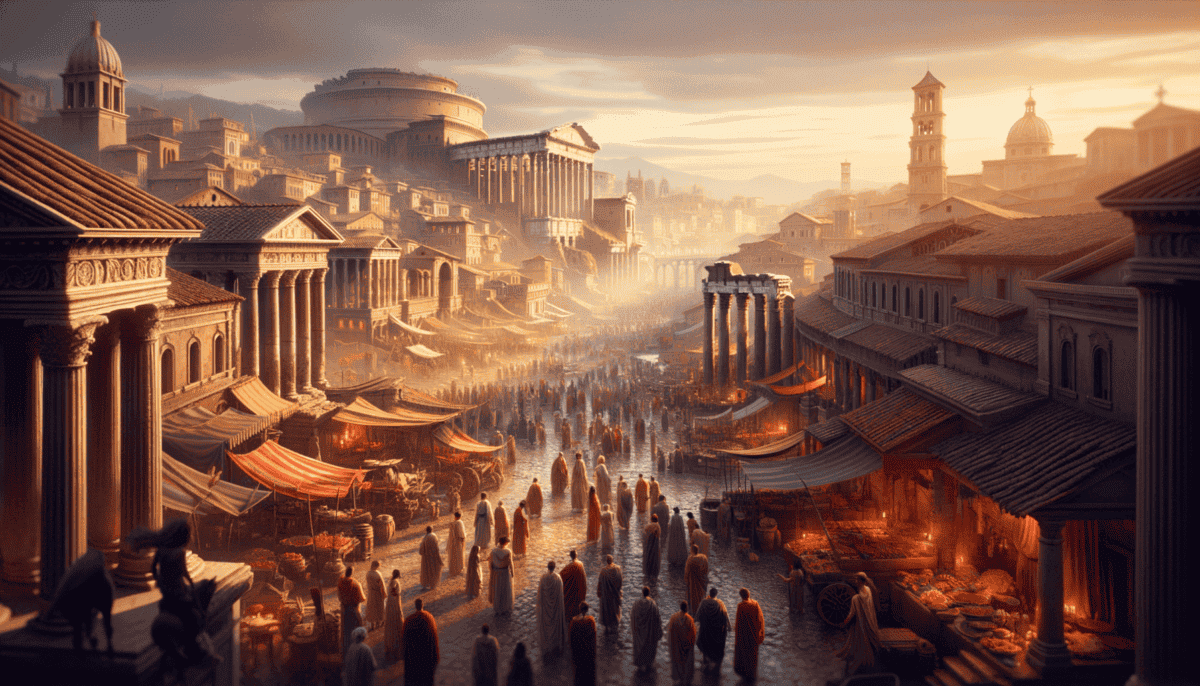The Wolf’s Children
Long ago, in a place where green hills met the blue sky, two special baby boys lay crying in a wooden basket by a rushing river. These twins were Romulus and Remus.
"What's going to happen to us?" little Remus whispered to his brother.
Their uncle, a mean king, had left them by the river. But something amazing was about to happen!
A friendly wolf found the babies. This wasn't just any wolf – she was special. Instead of being scary, she took care of the twins like they were her own pups. She fed them and kept them warm in her cave.
As the boys grew bigger, a kind shepherd named Faustulus found them. He and his wife raised Romulus and Remus to be strong and brave young men. They learned to hunt, run, and take care of sheep.
One day, Romulus said to his brother, "Let's build our own city!"
"Where should we build it?" Remus asked.
"On these seven beautiful hills!" Romulus pointed to the rolling green hills around them. They picked the perfect spot where traders, farmers, and travelers could all meet.
But the brothers couldn't agree on everything. They argued about which hill would be best for their new city. Romulus liked the Palatine Hill, while Remus preferred the Aventine Hill.
“We need to decide fairly,” Romulus suggested. “Let’s ask the gods to show us a sign!”
They watched the sky for birds, just like their shepherd father had taught them. Remus saw six birds, but Romulus saw twelve! This meant Romulus would be the one to build the city.
Romulus got to work right away. He used a plow to mark where the city walls would go. Some people say he used a bronze plow pulled by a white cow and a white bull.
As the city grew, more people came to live there. Romulus made rules to help everyone get along. He picked special helpers called senators – wise older men who would give him advice. He also created groups of soldiers to protect the city.
Romulus became the first king of Rome! He wore a special purple robe and sat on a fancy chair made of ivory. When he walked through the city, men called lictors would walk in front of him carrying bundles of sticks. This showed everyone that he was in charge.
Under Romulus's rule, Rome grew from a tiny town into a strong city. People from all around came to live there – farmers, traders, craftsmen, and even people who had left other cities.
“Our city will welcome anyone who wants to work hard and live in peace,” Romulus declared.
The city got bigger and stronger every day. They built houses of wood and clay, temples to honor their gods, and strong walls to keep everyone safe. People learned to work together, share their food, and help each other.
At night, the people would gather around fires to tell stories about the amazing wolf who saved their king when he was a baby. They were proud to be Romans, proud of their young city, and excited about what the future would bring.
Romulus had turned his dream into something real. The little babies who were saved by a wolf had grown up to start something amazing – a city that would become one of the greatest places in the whole world!
A Time of Peace and Prayer
After Romulus, a very different kind of king came to rule Rome. His name was Numa Pompilius, and he had a long white beard and kind eyes.
“Our city needs more than just strong walls,” Numa said softly. “We need peace in our hearts.”
Numa loved to walk through the city early in the morning. He would stop and talk to everyone – bakers making bread, children playing games, and farmers heading to their fields.
“What makes a city strong?” he would ask the people.
“Soldiers and weapons!” some would say.
“Big walls!” others would shout.
“No,” Numa would smile. “It’s the way we treat each other.”
Numa had big ideas to make Rome better. He built a special temple called the Temple of Janus. Its doors were open during war and closed during peace. During Numa’s time, the doors stayed closed! ️
He created special groups of priests and priestesses to help take care of the temples. The most famous were the Vestal Virgins, who kept a sacred fire burning day and night.
Numa also made a calendar to help farmers know when to plant their crops. It had 12 months, just like our calendar today!
But Numa’s biggest change was teaching the Romans about being kind and fair. He made new laws that helped people solve their problems without fighting.
“Before you get angry,” he would tell people, “take a deep breath and count to ten.”
He divided the city’s land fairly among the poor families. This made everyone happy because they could grow their own food.
Every month, Numa would gather the people in the big square. He taught them about respecting the gods and being good neighbors. He showed them how to have festivals and celebrations that brought everyone together.
People started to notice changes in Rome. There was less fighting and more singing. Gardens grew where there used to be empty lots. Children played safely in the streets.
“Our city is like a big family now,” people would say. “We help each other and share what we have.”
Numa also built a special house for the king, but he didn’t spend much time there. He preferred to be out with the people, listening to their stories and helping solve their problems.
One day, a little girl asked him, “Why do you work so hard to make everyone happy?”
Numa smiled and said, “Because when everyone is happy, our city grows stronger. Not just with walls and buildings, but with friendship and love.”
The Romans never forgot Numa’s teachings. Even when he grew very old, people would still come to him for advice. He taught them that being strong didn’t just mean having big muscles – it meant having a big heart too. ❤️
At night, when the sacred fire glowed in the temple and the stars twinkled above Rome, people would remember Numa’s words: “A city built on kindness will stand forever.” The peace and wisdom he brought to Rome would change the city – and the world – forever.
Peace Through Love and War
The sun rose over Rome’s seven hills as people gathered in the forum. There was worry in the air. The Sabine tribes who lived nearby were angry. They thought Rome was getting too big, too fast.
“They won’t let our traders pass through their lands,” a merchant complained to the king. “They say we’re taking over everything!”
The young men of Rome wanted to fight. But some wise elders remembered what King Numa taught them about peace. They needed a clever plan.
“We should invite them to our harvest festival,” suggested Hersilia, a kind Roman woman.
“But they’re our enemies!” others protested.
“Sometimes enemies can become friends,” she smiled wisely.
The Romans prepared a big festival. They decorated the streets with flowers and prepared delicious food. When the Sabine families arrived, they were surprised by how friendly everyone was.
Many Sabine women decided to stay in Rome. They married the Roman men. This made their families very angry at first. But the women had a special plan.
When the Sabine warriors came to attack Rome, something incredible happened. The women ran between the two armies!
“Stop!” they cried. “On one side are our fathers and brothers. On the other side are our husbands and children. We won’t let you fight!”
Both sides lowered their weapons. The women’s brave act brought peace. The Sabines and Romans decided to join together as one people.
The Romans learned something important that day. Love could be stronger than war. They started inviting other tribes to join them too. ️
“What makes Rome special?” a child asked their grandmother years later.
“We know how to turn strangers into family,” she answered. “That’s our secret.”
The Romans created a new way of welcoming people. When a tribe joined Rome, they could:
• Keep their own traditions and customs
• Join the Roman army
• Vote in Roman elections
• Become Roman citizens
• Share in Rome's wealth
As Rome grew bigger, they built new roads to connect all the people. Traders could travel safely. Children from different tribes played together. Everyone learned from each other. ️
The army changed too. Instead of just fighting, they learned to build bridges and help people in trouble. They protected traders on the roads and helped during floods or fires. ️
One old Sabine chief said, “I used to think Rome was our enemy. Now I see it’s like a big family where everyone belongs.”
The Romans had a saying: “The walls of Rome are built with friendship, not just stone.”
Every year, they celebrated the day the Sabine women brought peace. It reminded everyone that love and bravery could solve problems better than fighting. The festival became one of Rome’s happiest holidays.
As the stars came out over the city each night, Romans would look up and smile. Their city was growing stronger, not through war, but through friendship and understanding. The wisdom of peace was becoming part of who they were.
Building a Better Rome
Marcus wiped sweat from his forehead as he watched workers lay stones for the new aqueduct. The tall water bridge would bring fresh water to everyone in Rome.
“Look how high it goes!” said Julia, Marcus’s little sister. She pointed at the stone arches reaching toward the sky.
“That’s Roman engineering,” their father smiled proudly. “We’re making life better for everyone.” ️
“But how does the water flow uphill?” Julia asked.
“It’s all about the slope,” her father explained. “The water follows a gentle path downhill, like a very long slide!”
All around Rome, new things were being built. Workers were making roads with special stones that fit together like puzzle pieces. These roads stayed dry when it rained and lasted for hundreds of years! ️
In the fields outside the city, farmers were trying something new:
• They planted different crops each year to keep the soil healthy
• They used special plows that dug deeper into the ground
• They made better tools from strong metal
• They built irrigation ditches to water the crops
• They learned to store grain for winter
Inside Rome, people’s lives were changing too. Some families became very rich from trading or farming. Others worked as craftsmen or builders.
“Everyone has their place in Rome,” said Marcus’s mother. “Some lead, some build, some farm, some teach. Together, we make Rome strong.”
Julia loved watching the potters make clay jars. They used a new tool called a potter’s wheel that spun around fast. It helped them make perfect round pots quickly.
At night, the family gathered to eat dinner on new glass plates. Glass was another new thing the Romans learned to make. It was clear and smooth and much prettier than clay. ✨
“Rome is growing up,” Father said. “When I was young, we didn’t have these nice things.”
“Will Rome keep getting better?” Julia asked.
“Yes, little one,” Mother smiled. “As long as we keep learning and working together.”
The next day, Marcus helped carry water from the new fountain in their street. Before the aqueduct, people had to walk far to get water from the river. Now clean water flowed right into their neighborhood!
Even their clothes were changing. Rich Romans wore bright colors made from new dyes. Poor people had better clothes too, made from wool and cotton.
Marcus looked up at the nearly finished aqueduct. “One day,” he thought, “people will look at this and remember how Romans worked hard to make life better for everyone.”
As the sun set, the family walked home on their smooth stone street. Lamps lit the way, another new thing in Rome. The city was growing bigger and better every day, filled with clever ideas and hard work.
The New Kings Come
The streets of Rome buzzed with excitement. A strange man in fancy clothes rode through the city gates. His name was Tarquinius, and he came from a far place called Etruria.
“Look at his golden chariot!” Julia whispered to Marcus. They watched from their doorway as Tarquinius passed by. His clothes sparkled with jewels, and he wore a purple cape.
“Why is he here?” Marcus asked his father.
“He wants to be our new king,” Father replied. “He says he can make Rome even greater.”
Soon, Tarquinius became King Tarquinius the Elder. He brought many new things to Rome:
- Big stone temples with pretty paintings
- Circus games where people raced horses
- New ways to build houses and roads
- Beautiful jewelry and art
- Better ways to tell fortunes
But not everyone was happy. Some old Roman families didn’t like the new ways. “We should keep our old Roman customs,” they said.
“Things are different now,” Marcus heard people whisper in the market. “The king acts more like a god than a leader.”
Later, Tarquinius’s grandson became king. People called him Tarquinius the Proud. He was not as nice as his grandfather. He made people work very hard building big projects. ♂️
Julia noticed changes in their neighborhood. Guards walked the streets now. People spoke in quiet voices when talking about the king.
“Why do people look worried?” Julia asked her mother.
“Sometimes new things can be scary,” Mother said carefully. “And sometimes leaders forget to be kind.”
The proud king built bigger buildings than ever. He made Rome look beautiful, but he wasn’t nice to the people who did the work. Many Romans began to feel angry.
Marcus watched as more soldiers filled the streets. The king was afraid people might not like him, so he had guards protect him all the time. ️
At night, Marcus heard his parents talking softly. “Things can’t go on like this,” Father said. “The people are getting tired of kings who act like gods.”
Mother nodded. “Change is coming to Rome again. I hope it will be for the better.”
Outside their window, the big new buildings gleamed in the moonlight. Rome was bigger and fancier than ever before. But something else was growing too – a feeling that the people of Rome should have more say in how their city was run.
The Dawn of Freedom
The streets of Rome were quiet that morning. Too quiet. Marcus peeked out his window and saw people gathering in small groups, whispering. Something big was about to happen.
“The people are meeting in the Forum,” Father told Marcus and Julia. “They say we won’t have kings anymore.” His eyes were bright with hope. ⚔️
“But who will lead us?” Julia asked.
“The people will choose their leaders,” Mother explained. “They’ll serve for just a little while, not forever like kings.”
A man named Brutus stood up in the Forum. His voice rang out across the crowd: “No more kings! Rome should be free!” The people cheered so loud it made the birds fly from their nests. ️
The proud king Tarquinius was away fighting a war when it happened. When he tried to come back, the people closed the city gates.
“Go away!” they shouted. “Rome doesn’t want kings anymore!”
Marcus watched as people celebrated in the streets. They were dancing and hugging each other. Some were crying happy tears.
Julia helped her mother hang flowers from their window. “What happens now?” she asked.
“Now we build a new Rome,” Mother said. “One where everyone has a voice.”
The city began to change. People walked taller, spoke louder, and smiled more. They weren’t afraid anymore.
Marcus helped take down the king’s statues. In their place, the Romans put up new symbols of freedom. He felt proud to be part of this big change.
“Will you tell your children about today?” Father asked Marcus.
“I’ll tell everyone!” Marcus said. “About how Rome became free!”
And so the story of Rome began a new chapter. The little settlement that started on seven hills had grown into something wonderful. It wasn’t just a city anymore – it was becoming a republic where people had rights and could help make decisions.
As the sun set that evening, Marcus and Julia sat on their roof, watching the city glow golden in the last light. Rome looked different somehow – newer, fresher, full of hope. Together, the Roman people would write their own story, and it would be greater than any king could have made it. ✨


